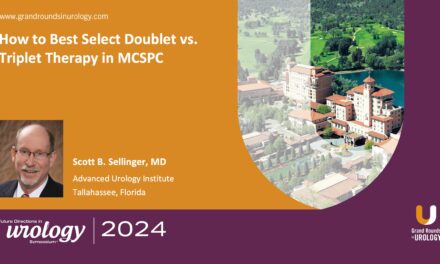Brian T. Helfand, MD, PhD, presented “Germline Genetics in Prostate Cancer” during the 31st International Prostate Cancer Update in July 2021 in Snowbird, Utah.
How to cite: Helfand, Brian T. “Germline Genetics in Prostate Cancer.” July 2021. Accessed Oct 2025. https://grandroundsinurology.com/germline-genetics-in-prostate-cancer/
Germline Genetics in Prostate Cancer – Summary
Brian T. Helfand, MD, PhD, Chief of the Division of Urology and the Ronald L. Chez Family and Richard Melman Family Endowed Chair at NorthShore University HealthSystem, Director of the Personalized Prostate Program, and Director of Clinical Research in the Program for Personalized Cancer Care, discusses germline genetic testing and its ability to support prostate cancer (PCa) diagnosis and prognosis when used effectively. He begins with the NCCN guidelines for PCa germline testing, detailing its recommended use for patients with: intermediate-risk, high-risk, regional or metastatic disease; intraductal histology; Ashkenazi Jewish ancestry; family history (FH) of high-risk germline mutations; and positive family history of cancer. Dr. Helfand then considers genetic assessments, stressing the importance of FH, rare pathogenic mutations (RPMs), and SNPs in reaching conclusions. He continues with an explanation of genetic risk score (GRS), a number calculated based on the cumulative variation across multiple SNPs which is then used to provide an estimate of disease risk, and shows data supporting the idea that GRS is more informative than FH. He looks at how to complete genetic testing with intention, suggesting screening with the goal of identifying men at risk of PCa and aggressive cancer, as well as identifying men who are likely to respond to specific chemotherapies. Dr. Helfand also reviews data from the UK biobank showing the associations FH, RPMs, and GRS have with PCa incidence and mortality. He also presents data on active surveillance showing that it should be used with caution if patients have any DNA damage repair genes. Dr. Helfand reviews data on DNA damage response and cancer therapy, showing that men with DNA double repair gene mutations are more responsive to PARP inhibitors and platinum-based chemo, while men with mismatch mutations are more responsive to immune checkpoint inhibitors. Dr. Helfand concludes by saying that genetic testing should be included in PCa decision-making more often and used to understand the future of PCa patients.
About The 31st Annual International Prostate Cancer Update:
The International Prostate Cancer Update (IPCU), founded in 1990, is a multi-day CME conference focused on prostate cancer treatment updates with expert, international faculty. It is led by expert physicians and is designed for urologists, medical oncologists, radiation oncologists, and other healthcare professionals involved in the diagnosis and treatment of prostate cancer. Dr. Helfand delivered this educational activity during the 31st iteration of the meeting in July 2021 in Snowbird, Utah.
ABOUT THE AUTHOR
Brian T. Helfand, MD, PhD, is Chief of the Division of Urology and the Ronald L. Chez Family and Richard Melman Family Endowed Chair at NorthShore University HealthSystem. He is Director of the Personalized Prostate Program and Director of Clinical Research in the Program for Personalized Cancer Care (PPCC). He is also an active surgical scientist who is involved in the care of patients with prostate cancer. His clinical care and research is focused on the implementation of genetic tests and biomarker studies for prostate cancer.
Dr. Helfand completed his undergraduate degree at Emory University. He received his medical training and PhD in Cell and Molecular Biology and Genetics from Northwestern University. He is a fellowship-trained urologic oncologist who has focused his research career on prostate cancer. He was recruited in 2011 from Northwestern University’s Feinberg School of Medicine, where he was faculty in the Department of Urology. Dr. Helfand is an internationally-known urologist and genomic translational researcher. He has received multiple grants from the NIH and has published over 140 peer-reviewed manuscripts in journals such as Nature Genetics, The Journal of Cell Biology, and Science Translational Medicine.
Dr. Helfand is involved in national and international research collaborations as an active member of the International Consortium for Prostate Cancer Genetics (ICPCG), the Prostate Cancer Specialized Program of Research Excellence (SPORE), the IMPACT) study, and the Lower Urinary Tract Dysfunction Research Network (LURN). His current research goals are focused on germline genetic variations and mutations. He is determined to use this information to assist in personal and informed clinical decision making about prostate cancer screening and treatment for patients and their family members.




